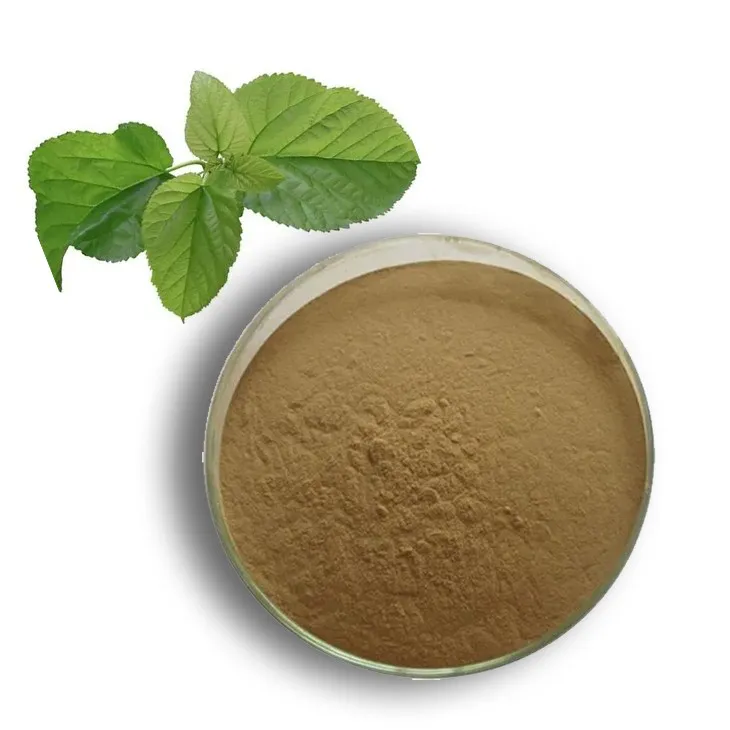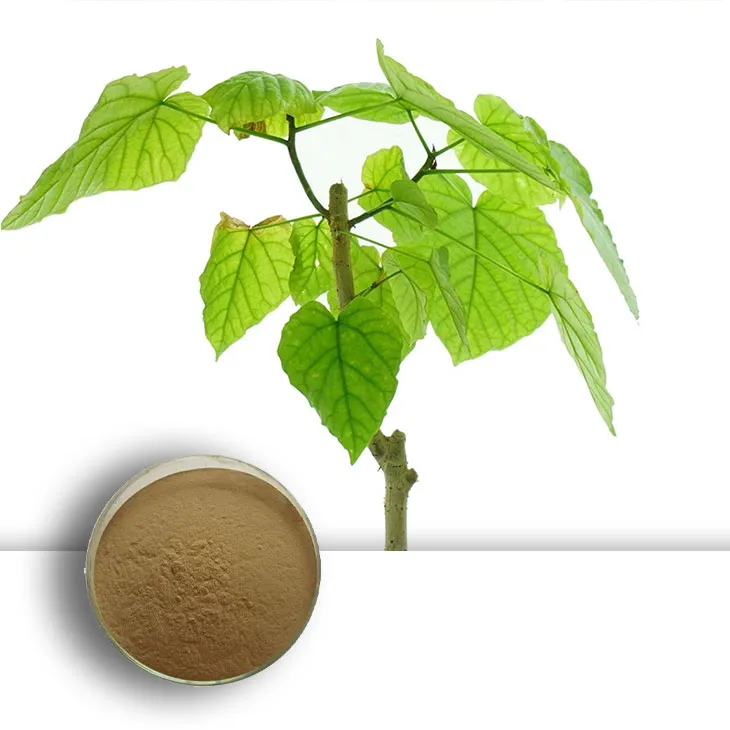- 0086-571-85302990
- sales@greenskybio.com
Five Effects of Mulberry Leaf Extract + Dosage, Side Effects
2024-11-11

1. Introduction
Mulberry leaves have been used in traditional medicine for centuries, especially in Asian cultures. Mulberry leaf Extract is now gaining popularity worldwide as a natural supplement. It is rich in various bioactive compounds, which contribute to its potential health - promoting effects.

2. Five Key Benefits of Mulberry leaf Extract
2.1 Blood Sugar Regulation
One of the most significant benefits of Mulberry leaf Extract is its effect on blood sugar levels. The extract contains compounds such as 1 - deoxynojirimycin (DNJ) which inhibits the enzymes that break down carbohydrates in the intestine. This slows down the absorption of glucose, preventing rapid spikes in blood sugar after meals.
Studies have shown that regular consumption of mulberry leaf extract can help in managing diabetes. For example, in diabetic animal models, it has been observed that the extract can reduce fasting blood glucose levels. In human trials as well, participants who took mulberry leaf extract supplements along with their regular diabetes medications showed better glycemic control compared to those who only took the medications.
2.2 Cholesterol Management
Mulberry leaf extract may also play a role in cholesterol management. It has been found to have a positive impact on lipid profiles. The extract can reduce levels of low - density lipoprotein (LDL) cholesterol, often referred to as "bad" cholesterol, while potentially increasing levels of high - density lipoprotein (HDL) cholesterol, the "good" cholesterol.
The mechanism behind this is likely related to its antioxidant and anti - inflammatory properties. By reducing oxidative stress and inflammation in the body, it helps in maintaining a healthy balance of lipids. For instance, research has indicated that certain flavonoids present in the mulberry leaf extract interact with the liver cells to modulate cholesterol synthesis and metabolism.
2.3 Antioxidant Activity
The extract is a rich source of antioxidants. Antioxidants are important for protecting the body against oxidative damage caused by free radicals. Free radicals are unstable molecules that can damage cells, proteins, and DNA, and are associated with various chronic diseases such as cancer, heart disease, and neurodegenerative disorders.
Mulberry leaf extract contains flavonoids, phenolic acids, and other antioxidant compounds. These antioxidants scavenge free radicals, neutralize their harmful effects, and help in maintaining the overall health of the body. In vitro studies have demonstrated the strong antioxidant capacity of mulberry leaf extract, and some in vivo studies also suggest that it can increase the antioxidant status in the body.
2.4 Anti - inflammatory Effects
Chronic inflammation is at the root of many diseases. Mulberry leaf extract exhibits anti - inflammatory properties. It can inhibit the production of inflammatory mediators such as cytokines and prostaglandins.
Inflammation in the body can be triggered by various factors such as infections, diet, and environmental toxins. By reducing inflammation, the extract may help in alleviating symptoms of inflammatory conditions like arthritis. For example, in some animal studies, mulberry leaf extract has been shown to reduce joint swelling and pain associated with arthritis.
2.5 Cardiovascular Health Support
Combining its effects on blood sugar, cholesterol, and inflammation, mulberry leaf extract provides support for cardiovascular health. By regulating blood sugar levels, it reduces the risk of diabetes - related cardiovascular complications. Lowering LDL cholesterol and reducing inflammation also contribute to a healthier heart.
Additionally, some studies suggest that the extract may have a direct effect on blood vessels, improving their function and reducing the risk of atherosclerosis, a condition characterized by the build - up of plaque in the arteries.

3. Dosage Guidelines
The appropriate dosage of mulberry leaf extract can vary depending on several factors, including the form of the extract (e.g., powder, capsule, tincture), the intended use (e.g., general health promotion or for a specific condition), and individual factors such as age, weight, and overall health.
As a general guideline for general health promotion:
- If using a mulberry leaf extract powder, a typical starting dose could be around 1 - 2 grams per day. This can be mixed into a beverage such as water or juice.
- For capsules, starting with 500 - 1000 mg per day is common. It is important to follow the instructions on the product label.
- In the case of blood sugar management, some studies have used doses of up to 3 grams per day of mulberry leaf extract powder. But this should be done under the supervision of a healthcare provider, especially for those with diabetes who are already taking medications, as there may be a risk of hypoglycemia (low blood sugar).
- When aiming to improve cholesterol levels, a dose of around 1.5 - 2 grams per day of the extract has been investigated in some trials, but again, individual monitoring may be necessary.

4. Side Effects of Mulberry Leaf Extract
While mulberry leaf extract is generally considered safe for most people when taken in appropriate doses, there can be some potential side effects:
- Gastrointestinal Disturbances: Some people may experience mild stomach upset, including nausea, bloating, or diarrhea. This is more likely to occur when starting the supplement or if taking a higher - than - recommended dose. To minimize these effects, it is recommended to start with a low dose and take the supplement with food.
- Allergic Reactions: Although rare, allergic reactions to mulberry leaf extract can occur. Symptoms may include skin rash, itching, swelling, or difficulty breathing. If any of these symptoms occur, stop taking the supplement immediately and seek medical attention.
- Hypoglycemia Risk: As mentioned earlier, in people with diabetes or those at risk of hypoglycemia, taking high doses of mulberry leaf extract without proper medical supervision can lead to dangerously low blood sugar levels. This is because of its blood - sugar - lowering effects.
5. Conclusion
Mulberry leaf extract offers several potential health benefits, including blood sugar regulation, cholesterol management, antioxidant activity, anti - inflammatory effects, and support for cardiovascular health. However, it is important to follow proper dosage guidelines and be aware of the potential side effects. As with any supplement, it is always best to consult a healthcare professional before starting to take mulberry leaf extract, especially if you have existing health problems or are taking other medications.
FAQ:
What are the five effects of Mulberry Leaf Extract?
1. Blood sugar regulation: Mulberry leaf extract may help in controlling blood sugar levels. It contains compounds that can influence insulin sensitivity and glucose metabolism. 2. Antioxidant properties: It is rich in antioxidants such as flavonoids. These antioxidants can help neutralize free radicals in the body, reducing oxidative stress and potentially protecting cells from damage. 3. Cholesterol management: May have a positive impact on cholesterol levels by helping to lower LDL (bad) cholesterol. 4. Anti - inflammatory effects: Can help reduce inflammation in the body, which is associated with many chronic diseases. 5. Blood pressure regulation: Some studies suggest that it may contribute to maintaining healthy blood pressure levels.
What is the recommended dosage of Mulberry Leaf Extract?
The appropriate dosage can vary depending on various factors such as the form of the extract (e.g., powder, capsule), the individual's health condition, and the purpose of use. However, in general, for a standard mulberry leaf extract supplement, a common dosage range might be around 500 - 1500 mg per day. It is always best to consult a healthcare provider before starting any new supplement regimen to ensure the dosage is safe and appropriate for you.
Are there any side effects of Mulberry Leaf Extract?
While mulberry leaf extract is generally considered safe for most people when taken in appropriate doses, some potential side effects may occur. These can include mild gastrointestinal discomfort such as nausea, diarrhea, or abdominal cramps in some individuals. Also, in rare cases, allergic reactions may occur in people who are sensitive to mulberry or related plants. Pregnant or breastfeeding women should be especially cautious and consult their healthcare provider before using mulberry leaf extract as its safety in these situations has not been fully established.
Can Mulberry Leaf Extract interact with medications?
Yes, it can. Mulberry leaf extract may interact with medications for diabetes and blood pressure. For example, if you are taking medications to lower blood sugar, the combined use of mulberry leaf extract could potentially cause blood sugar levels to drop too low. Similarly, for blood pressure medications, it might enhance the blood - pressure - lowering effect. It is crucial to inform your doctor if you are planning to take mulberry leaf extract, especially if you are on any medications.
How does Mulberry Leaf Extract regulate blood sugar?
Mulberry leaf extract contains components like DNJ (1 - deoxynojirimycin). DNJ can inhibit the activity of certain enzymes involved in carbohydrate digestion, which slows down the breakdown of complex carbohydrates into simple sugars. This, in turn, can lead to a more gradual release of glucose into the bloodstream, preventing rapid spikes in blood sugar levels. Additionally, it may also enhance insulin sensitivity in cells, allowing them to better respond to insulin and take up glucose from the blood more effectively.
Related literature
- The Health Benefits of Mulberry Leaf Extract: A Comprehensive Review"
- "Mulberry Leaf Extract: Dosage, Efficacy, and Safety Considerations"
- "Antioxidant and Anti - inflammatory Properties of Mulberry Leaf Extract"
- ▶ Hesperidin
- ▶ citrus bioflavonoids
- ▶ plant extract
- ▶ lycopene
- ▶ Diosmin
- ▶ Grape seed extract
- ▶ Sea buckthorn Juice Powder
- ▶ Beetroot powder
- ▶ Hops Extract
- ▶ Artichoke Extract
- ▶ Reishi mushroom extract
- ▶ Astaxanthin
- ▶ Green Tea Extract
- ▶ Curcumin Extract
- ▶ Horse Chestnut Extract
- ▶ Other Problems
- ▶ Boswellia Serrata Extract
- ▶ Resveratrol Extract
- ▶ Marigold Extract
- ▶ Grape Leaf Extract
- ▶ blog3
- ▶ blog4
- ▶ blog5
-
Organic Tongkat Ali extract powder factory.
2024-11-11
-
How to make powder with ashwagandha extract.
2024-11-11
-
Rosehip extract manufacturers from China.
2024-11-11
-
The best cat's claw extract in nature.
2024-11-11
-
Chinese Dandelion Leaf Extract Suppliers.
2024-11-11
-
Polygonum Cuspidatum Extract
2024-11-11
-
Chasteberry Extract
2024-11-11
-
Agaricus Blazei Extract
2024-11-11
-
Gynostemma pentaphyllum extract
2024-11-11
-
Genistein
2024-11-11
-
Fig Extract
2024-11-11
-
Natural grape seed extract
2024-11-11
-
Andrographis Paniculata Extract Powder
2024-11-11
-
Ginseng Root Extract
2024-11-11
-
Rosemary extract
2024-11-11





















